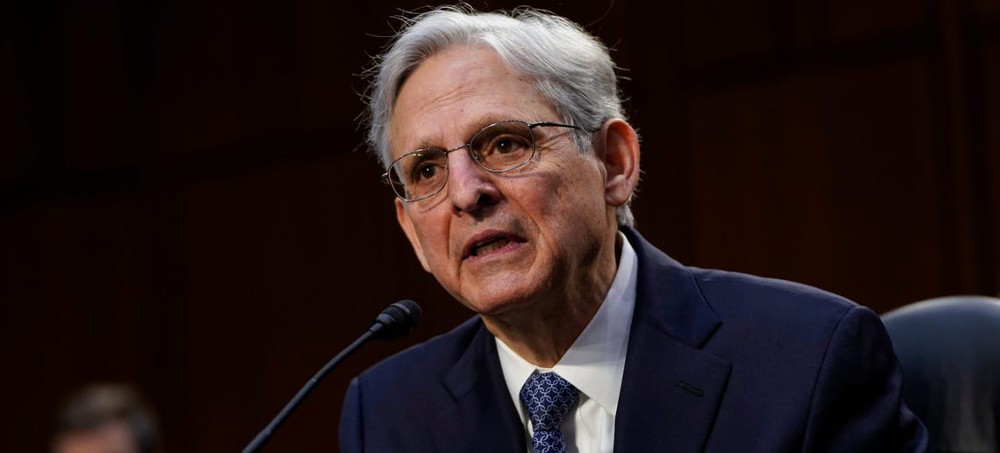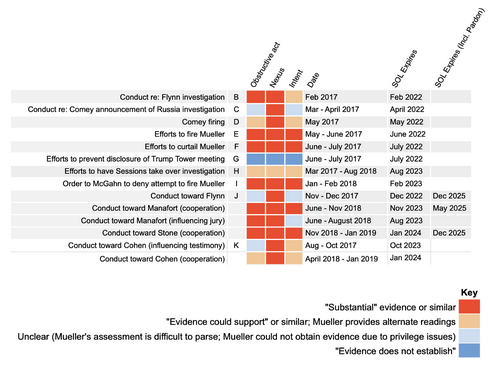
22 December 21
Live on the homepage now!
Reader Supported News
WE GO BROKE — If we turn our attention away from funding even for a moment ... we go broke. If we say, “thank you” to our donors for donating, they think we have all the money we will ever need to run RSN and … we go broke. If we are not prepared to fight for every donation every day … we go broke. Don’t wait until — we go broke — to support RSN.
Marc Ash • Founder, Reader Supported News
Sure, I'll make a donation!

FOCUS: Merrick Garland Needs to Speak Up
Quinta Jurecic, Andrew Kent and Benjamin Wittes, Lawfare
Excerpt: "Attorney General Merrick Garland is taking a great deal of criticism these days."
Attorney General Merrick Garland is taking a great deal of criticism these days.
He’s being attacked for not having indicted former President Trump, for not having brought cases faster against witnesses who have defied the Jan. 6 committee, and for not having moved more aggressively against political figures for their supposed involvement in the Jan. 6 insurrection.
These criticisms speak to genuine frustrations with the slow pace of department action. They are also based on two flawed assumptions.
The first is the assumption that the evidence and equities would support prosecutions and, consequently, that the absence of criminal cases reveals weakness or hypercaution on the Justice Department’s part. This may be the case—but it may not. The absence of prosecutions could also reflect inadequacies in the evidence needed to bring cases.
The second problem is the confusion of what has not happened with what has not happened yet. The Justice Department can be very busy without making a lot of noise. The fact that indictments have not materialized so far does not mean they won’t appear tomorrow—or the day after.
But nearly a year into his tenure as attorney general, though much of the criticism of Garland has been unfair or at least premature, the attorney general does have something to answer for: his relative silence.
When Joe Biden nominated Garland to be attorney general, Garland spoke explicitly about Edward Levi, the former president of the University of Chicago and a noted legal scholar who served as attorney general under President Gerald Ford.
“Ed Levi and Griffin Bell, the first Attorneys General appointed after Watergate, had enunciated the norms that would ensure the department’s adherence to the rule of law,” Garland said in his acceptance speech:
Those policies included guaranteeing the independence of the department from partisan influence and law enforcement investigations, regulating communications with the White House, establishing guidelines for FBI investigations, ensuring respect for the professionalism of DOJ’s lawyers and agents, and setting our principles to guide the exercise of prosecutorial discretion. Those policies became part of the DNA of every career lawyer and agent.
Garland’s mission as attorney general, he stressed, would be “to reaffirm those policies as the principles upon which the department operates.” And he quoted another speech from Levi’s swearing in: “Nothing can more weaken the quality of life, or more imperil the realization of the goals we all hold dear, than our failure to make clear by words and deed that our law is not the instrument of partisan purpose.”
At Garland’s first speech to the Justice Department staff, he once again invoked Levi:
The only way we can succeed and retain the trust of the American people is to adhere to the norms that have become part of the DNA of every Justice Department employee since Edward Levi’s stint as the first post-Watergate Attorney General.
As I said at the announcement of my nomination, those norms require that like cases be treated alike. That there not be one rule for Democrats and another for Republicans; One rule for friends and another for foes; One rule for the powerful and another for the powerless; One rule for the rich and another for the poor; Or different rules depending upon one's race or ethnicity. At his swearing in, Attorney General Levi said: “If we are to have a government of laws and not of men, then it takes dedicated men and women to accomplish this through their zeal and determination, and also through fairness and impartiality. And I know that this Department always has had such dedicated men and women.” I, too, know that this Department has and always has had such dedicated people. I am honored to work with you once again. Together, we will show the American people by word and deed that the Department of Justice pursues equal justice and adheres to the rule of law.
Garland is not the only senior Justice Department official to refer to Levi’s legacy in describing the mission of the Justice Department under President Biden. At her confirmation hearing, Deputy Attorney General Lisa Monaco declared that:
My first job in the Department was as counsel to Janet Reno, the first woman Attorney General. She hung a portrait of Attorney General Edward Levi in her conference room. It signaled her commitment to continuing Levi’s post-Watergate work to ensure the Department’s independence. It symbolized for me then, and is a reminder today, that the Department’s leaders have a duty to remember and reaffirm the values of the institution. When Attorney General Levi was asked what he thought the Department needed most after Watergate, he responded, “A soul.”
There’s a very good reason the senior Justice Department leadership keeps pointing to Ed Levi as a kind of founding father of the Justice Department they seek to restore. Indeed, we are sympathetic to the Justice Department’s need to revive the norms and practices of apolitical, independent, and professional justice that Levi did more than any other single person to create. Before Biden was even elected, in fact, one of us tweeted that Garland should be attorney general because he “is the closest thing the country has right now to an Ed Levi figure to restore the Justice Department.” Another of us wrote last spring an article in the Atlantic analyzing Levi’s legacy as a model for Garland.
Yet Garland seems to be ignoring one crucial aspect of Levi’s legacy: Ed Levi spoke a lot. Garland has been, in sharp contrast, largely invisible.
You don’t establish norms, or reestablish them, merely by modeling them. You establish them by articulating them, by talking about them, and by convincing people that they are the right way to behave. Levi understood this. His speeches and congressional testimonies as attorney general were numerous, highly substantive, and made arguments on behalf of the direction he wished to see the department go. They are a unique body of work among attorneys general, considered intellectually significant enough to have been collected and published as a volume by the University of Chicago Press.
Levi himself, we have learned, personally attached great importance to his speeches and testimonies. According to John Buckley, who served as one of Levi’s special assistants at the department and worked on some of the speeches, Levi wrote them himself—working on each with one of his special assistants.
Under Levi’s predecessor, William Saxbe, the public relations office would write the attorney general’s addresses. But Levi “believed in communication” and “labored over his speeches, testimony, [and] addresses,” Buckley said in a recent interview. He would “bang away at a manual typewriter” and edit the speeches with a fountain pen. “Those were his words.”
When he left office, his speeches were sufficiently significant to Levi that he bound them in a printed volume and gave a copy to each of the special assistants. It shows, Buckley says, “how much importance he attached to everything he wrote.”
Levi understood that certain Department of Justice issues were important enough that he needed to speak candidly and in detail about them to the public. For instance, the massive extent of the FBI’s “black bag jobs” and warrantless wiretapping of American citizens, sometimes for purposes of gathering political intelligence, had come to light through investigative journalism, congressional oversight, and some long overdue Department of Justice housecleaning started under Levi’s predecessor, Saxbe. J. Edgar Hoover’s FBI was also found to have gathered salacious material on a wide range of public figures, including members of Congress, and to have engaged in abusive and sometimes bizarre efforts to disrupt and discredit groups and individuals it considered radical. The revelations understandably lowered public opinion of the department’s integrity, and raised legitimate concerns about how deep the rot went and whether it was continuing.
Levi candidly owned up to mistakes: “[W]e all realize that in the past there have been grave abuses” by the FBI. And he named and described them. The “supervision by Attorneys General” of the FBI “has been sporadic, practically nonexistent, or ineffective.” He vowed to fix that and explained very specifically how he aimed to do it.
Levi also spoke repeatedly about programmatic efforts to remedy the sources of the problems. For example, he described to Congress and the public how he had tasked a Justice Department committee to draft detailed guidelines to rein in FBI misbehavior and increase oversight in sensitive areas, such as investigations that touched on political figures and political groups, the issuance of subpoenas to members of the press, and the use of informants. He repeatedly articulated the department’s legal views, along with policies designed to have warrantless wiretapping for foreign intelligence purposes narrowly circumscribed and subject to his personal oversight. He spoke publicly and specifically about the department’s work with Congress on a broad statute to bring under judicial oversight all domestic wiretapping for national security purposes. He described the outrageous FBI conduct toward Martin Luther King Jr. and described how he had tasked non-FBI officials to credibly and independently investigate it. Levi talked about how “important” it was that “the public get assurances that there are not such abuses” happening anymore. His goal was a “reconstruction” of the department and the public’s confidence in it, and a “reaffirmation of the effectiveness, independence and integrity of law enforcement agencies.”
Garland comes from a different school of thought on public engagement. During his long service as a judge, not only did he not give speeches or interviews describing his thinking and goals. He didn’t speak publicly at all. He didn’t speak at universities, as many judges do. He didn’t write law review articles. In his earlier stint at the Justice Department, he never cut much of a public figure either, though everyone understood that he was one of the most important people in the Main Justice building. He is steeped in the department’s culture of quietness, and he took that culture with him to the judiciary—where he was far more quiet than his contemporaries on the bench.
This quietness on Garland’s part is an expression of certain long-standing Justice Department norms. The department, according to this model, speaks almost entirely in court. It does not comment on pending investigative or prosecutorial matters outside of that. It does not behave politically—and shutting up is one very good way of avoiding saying things that could be construed in a political fashion. And the current moment has undoubtedly reinforced in Garland the wisdom of silence. His predecessor, William Barr, made all kinds of public comments that brought the department’s conduct into disrepute, speculating on what may have happened during the Russia investigation, for example. And before his firing, FBI Director James Comey was widely blasted for his comments about the Clinton email investigation during the last weeks before the 2016 election. So Garland may well have an instinct that the less he says the better.
The trouble is that, while silence by the attorney general reflects the department’s norms, it is a singularly bad means of establishing—or reestablishing—them.
In Garland’s defense, in deciding whether and how to speak publicly about past abuses and the current work of the department, he is facing problems that in some ways are tougher than those that confronted Levi. When Levi took office, the question about whether a former president who had potentially violated a number of criminal laws should be prosecuted had been resolved already: President Ford had granted a blanket pardon to Richard Nixon. Politically sensitive prosecutions of Watergate defendants had been handed off to a special prosecutor’s office. By contrast, questions about prosecuting Donald Trump and his associates must be faced by Garland himself and the departmental prosecutors working under him.
Levi’s credibility and freedom to operate were almost certainly enhanced by the facts that American politics, culture and media were less polarized in the 1970s than today, and that Levi’s criticisms of past abuses at the Department of Justice and White House often involved a current Republican administration criticizing a former Republican administration. Garland—unfortunately for him—must act and speak in a time of both fierce political tribalism and a social media environment that amplifies conflict, extreme positions and lies, all while laboring under the disability that criticisms from a Democratic attorney general of Republican predecessors will be discounted by many observers who will simply assume it to be politically motivated.
Despite our sympathy with the challenges facing Garland, his unwillingness to give the public any insight into his thinking seems ripe for criticism. It reflects a decision not to sell a vision—a vision that Garland clearly possesses and embodies—about how decisions should get made when the department is functioning properly.
There are a lot of such decisions before the department on which the public understanding and public debate would benefit from hearing the attorney general’s thinking. When Garland issued a policy strictly limiting contacts between the White House and the Justice Department—a policy very similar to ones that had been in place since the late 1970s—he could have given a speech explaining his goals and his choices. These policies seek to ensure that investigative and prosecutorial decisions about specific individuals are made based on law and fact, as evaluated by department lawyers and law enforcement professionals, not based on partisan or other improper considerations emanating from the White House. These norms were flagrantly abused during the Trump administration, and are in need of public reaffirmation. But Garland gave no such speech, leaving it to the press to report on the existence of the new policy and explain its significance to the public.
There are other instances in which more speaking would have been preferable. The department has reached plea agreements with a number of Jan. 6 defendants and has faced criticism, including from skeptical judges, for some of the relatively lenient sentences it has sought in those cases. What coordinating mechanisms have been set up to make sure that, as Garland himself put it, “like cases [are] treated alike”? And has there been any policy-level guidance about how different fact patterns should be charged?
Questions about when the department will act on criminal contempt referrals from Congress about witness refusals to comply with subpoenas from the Jan. 6 committee—such as that of Mark Meadows, Trump’s former chief of staff—are also fraught. It is, of course, correct for the department to avoid specific comments about individual pending matters. But this is not simply a collection of individual cases. It is a politically explosive and undeveloped area of law and practice that implicates fundamental separation of powers questions. The public would benefit from hearing reasoned discussion from the attorney general about how the department is approaching these referrals in broad terms. How is it balancing its institutional obligations to the legislature to bring contempt cases with its own interests in preserving a robust executive privilege?
Other areas would similarly benefit from public explanation. After the Sept. 11 attacks, the FBI and the Justice Department gave regular briefings on the investigation. There has been no such comparable effort to keep the public informed of the department’s progress in the Jan. 6 investigation—an investigation of similar scope and scale. Why not?
There is another, more internal question, about which Garland might turn the focus outward: What, if anything, is the department doing within its own ranks to try to rebuild norms and protect against potential misuse of law enforcement for partisan or personal ends in the future? Levi talked about this constantly; Garland has been quiet—except insofar as he has issued a new memorandum on White House contacts. But this question is critical, because it goes to the question of whether any of the changes he’s contemplating will outlast him or meaningfully constrain a less scrupulous attorney general.
Perhaps most importantly, what does the attorney general think—in broad terms, without commenting on any specific investigation—about when it is proper for the department to revisit a criminal investigation formally closed by a prior administration? This is a matter about which prior attorneys general have spoken. It is of acute concern right now with respect to the findings of the Mueller investigation, in particular Special Counsel Robert Mueller’s findings concerning potential obstruction of justice by Trump. Barr personally determined not to prosecute on the grounds that the evidence collected by Mueller was “not sufficient to establish that the President committed an obstruction-of-justice offense”—a decision widely criticized at the time as politically motivated. On entering office, Garland quickly faced calls to take a fresh look at the Justice Department’s charging decision.
So far, there have been no outward indications that the department is reconsidering Barr’s choice. That doesn’t mean that nothing is happening—Mueller left the Justice Department with a rich evidentiary record to pore over without necessarily needing to conduct further investigation. But there is a new urgency to this issue, because the window is beginning to close on the Justice Department’s ability to bring charges against Trump over obstruction
The statute of limitations for the various obstruction of justice statutes at issue is five years. Trump’s potential obstructive acts, as documented in the Mueller report, spanned from February 2017 through January 2019—so starting in February 2022, the statute of limitations will begin to kick in.
The below chart sets out the various instances of potential obstruction of justice identified by Mueller along with the expiration date for the statute of limitations. It’s an updated version of the obstruction heat map published by Lawfare after the Mueller report’s release, identifying how Mueller evaluates the strength of the three components of the obstruction statutes—an obstructive act, a nexus between the act and an official proceeding, and corrupt intent. This updated edition includes new information about Trump’s actions toward his confidante Roger Stone, which were redacted in the original copy of the Mueller report shared with the public and only revealed in July 2020. It also incorporates Trump’s pardons of Michael Flynn, Paul Manafort and Roger Stone—all of which he granted in 2020, and which arguably constitute potential obstructive acts that reset the clock on the statute of limitations.

As the chart shows, 2022 and 2023 will be crucial years for the Justice Department’s decision-making. The department will face its first deadline in February, concerning whether or not to charge Trump for his infamous conversation with then-FBI Director Comey over the bureau’s investigation into Trump’s former National Security Adviser Michael Flynn. But as the heat map shows, the strongest potential obstruction charges against Trump—as Mueller identifies them—will start to expire in June and July 2022, five years after Trump sought to engineer Mueller’s firing and then to hamstring his investigation. The chart highlights in red the expiration dates for the statute of limitations on these particularly strong cases, on the grounds that they potentially represent the hardest decisions for the Justice Department to make.
As far as we can tell, Garland has not spoken in public on the subject, leaving commentators to guess and prognosticate about the approach that the Justice Department might be taking. While it would obviously be improper for the department, or the attorney general, to speak to specific charges or defendants, it does not seem unreasonable to expect the attorney general to give some window into his thinking about the fundamental questions: Is the department deferring to Barr’s resolution of the matter? Has it, in fact, taken a look and determined that charges would be inappropriate? Or are questions arising from the Mueller report matters of active consideration?
These questions cut to the heart of public confidence in the Justice Department. A significant number of Americans are waiting for the department to hold Trump legally responsible for the many abuses for which he dodged accountability before. If the department doesn’t take such action, even if for very good reasons, these people will be disappointed and frustrated. Justice Department officials might brush off such reactions, except that this disappointment will inevitably undercut Garland’s efforts to “retain the trust of the American people.”
One of the lessons of Trump’s attacks on the integrity of the Justice Department is that most Americans don’t have a strong understanding of why independence in law enforcement matters or of the norms that, since Levi, have guided the department. Perhaps Garland’s view is that the risks of criminally investigating a former president, even in this time, are too great to take, too much of a breach of the department’s traditions. But he cannot expect people to understand that, or have a reasoned discussion of it, without first explaining it to them. And in the absence of an explanation, members of the public will come up with their own ideas—like weakness or lack of commitment to accountability. That silence undercuts the project to which Garland has committed himself.
If the goal of the Justice Department under Garland, as it was under Levi, is to rebuild the expectation that the department will act apolitically on investigative and prosecutorial matters, public communications matter. Public communications from the attorney general himself matter a lot. Garland is a scholarly man, a deeply thoughtful person. He is leaving one of his most important tools in the shed: As Levi said in one speech, “The basic tool for the lawyer is the word.”
READ MORE
Contribute to RSN
Follow us on facebook and twitter!
Update My Monthly Donation
PO Box 2043 / Citrus Heights, CA 95611

















